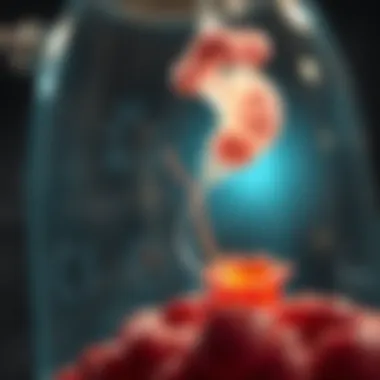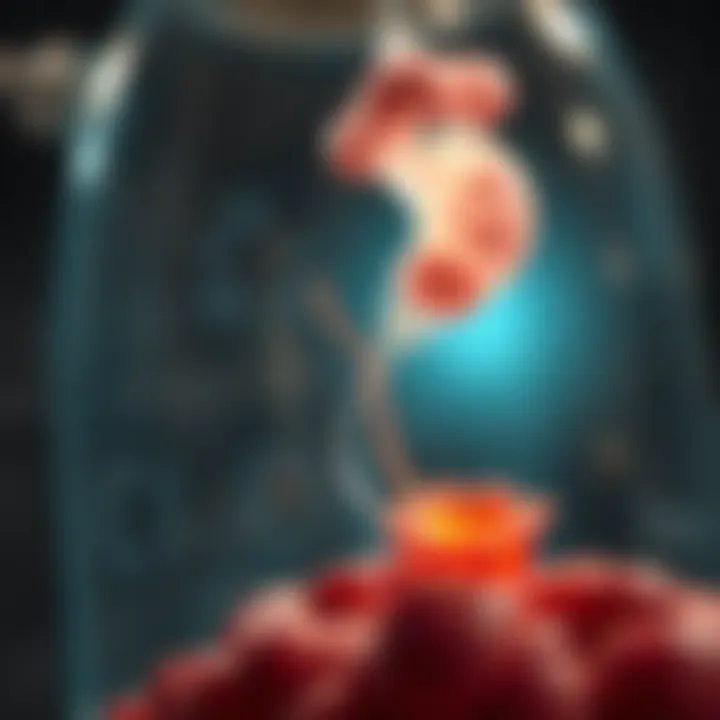Fecal Transplantation: An In-Depth Exploration of Treatment


Intro
Fecal transplantation is a medical procedure often clouded in a shroud of discomfort for many. Yet, this evolving treatment has been carving out a name for itself in the realm of gastrointestinal health. By transferring stool from a healthy donor to a patient plagued with various gastrointestinal issues, particularly recurrent Clostridioides difficile infections, fecal transplantation offers a novel approach that is proving its mettle in modern medicine.
The microbiome, a complex community of microorganisms residing in our intestinal tract, plays a daunting role in maintaining gut health. An imbalance in this microbiome can lead to dire health consequences, from unexplained bloating to serious infections. In such cases, fecal transplantation serves not just as a remedy but as a beacon of hope.
Through this article, we aim to shed light on the multifaceted aspects of fecal transplantation, diving into scientific principles, current research trends, and ethical considerations. Join us as we explore this innovative process, unraveling its mechanisms, effectiveness, and the future it holds in the medical community.
Key Concepts
Definition of the Main Idea
At its core, fecal transplantation is the transfer of fecal matter from a healthy individual into a recipient, often through a colonoscopy or enema. The goal? To restore the recipient's gut microbiome to a more balanced state. This procedure comes as a last resort for many whose gut flora has been severely disrupted, often after severe antibiotic use or recurrent infections. It sounds simple but the science behind it is anything but.
Overview of Scientific Principles
Understanding fecal transplantation necessitates a look into the intricate interplay of gut microbiota.
- Microbiome Dynamics: A healthy microbiome is rich with diverse bacteria that play a significant role in digestion and immunity. When this ecosystem is disrupted, pathogenic bacteria can proliferate, leading to conditions like Clostridioides difficile infection.
- Mechanisms of Action: The theoretical framework surrounding fecal transplantation posits that the introduction of new, healthy microbiota can outcompete harmful bacteria, restore metabolism, and enhance immune response.
By effectively re-establishing a healthy bacterial environment, fecal transplantation works to alleviate symptoms, reduce recurrence of infections, and promote overall gut health.
Current Research Trends
Recent Studies and Findings
Recent research into fecal transplantation has been gaining traction, with studies highlighting its potential not only for treating gastrointestinal disorders but also for broader implications, such as obesity and autoimmune diseases.
- A paper published in the New England Journal of Medicine demonstrated significant success rates in treating patients with recurrent Clostridioides difficile infections through fecal transplantation, showing improvement in an astonishing percentage of cases post-treatment.
- Another exciting study revealed potential benefits in mental health conditions linked to gut health. This groundbreaking research hints at the gut-brain axis, suggesting that microbiome composition might influence mood and cognition.
Significant Breakthroughs in the Field
- Standardized Protocols: There has been progress in establishing standardized protocols for fecal transplantation, increasing safety awareness and patient acceptance.
- Genomic Analysis: Advanced genomic technologies now allow for in-depth analysis of donor microbiomes, ensuring better matching and outcomes for recipients.
Fecal transplantation is carving out an essential niche in the medical landscape, laying the foundation for further advancements in microbiome science and its myriad implications.
"The gut microbiome is not just a passive observer, but an active participant in maintaining health and modulating disease."
"The gut microbiome is not just a passive observer, but an active participant in maintaining health and modulating disease."
Preamble to Fecal Transplantation
Fecal transplantation has emerged as an intriguing therapeutic option within the realm of gastroenterology. This procedure, which involves the transfer of stool from a healthy donor to a patient, plays a critical role primarily in addressing recurrent Clostridioides difficile infections. However, its potential applications extend beyond this single condition and touch on broader aspects of gut health and microbiome restoration. In exploring this topic, we will uncover not only the historical milestones that have contributed to its acceptance but also provide a comprehensive overview of its definition and clinical significance.
Historical Background
The roots of fecal transplantation can be traced back to ancient medical practices. Historical texts from China mention the use of stools in various treatments, although these practices were often shrouded in mysticism rather than scientific method. Fast forward to the 20th century; the treatment gained a foothold in Western medicine during the 1950s. Researchers noted significant improvements in patients suffering from severe gastrointestinal issues, particularly those caused by antibiotics disrupting gut flora. This led to the inception of fecal microbiota transplants, although it wasn’t until the early 2000s that fecal transplantation became more widely recognized as a legitimate medical procedure.
In contemporary times, seminal studies have reinforced its efficacy, especially in combatting Clostridioides difficile. The shift from anecdotal evidence to rigorous clinical trials marked a significant turning point, bringing fecal transplantation into the spotlight of modern medical practices.
Definition and Overview
So what exactly is fecal transplantation? Simply put, it is a procedure that transfers stool from a healthy individual to a patient, aimed at restoring the natural balance of the gut microbiome. It is predominantly utilized for treating recurrent Clostridioides difficile infections, a condition that has gained notoriety for its resistance to standard antibiotic treatments. When the gut’s microbiome is disrupted—often through antibiotics—the pathogenic bacteria can take hold, leading to debilitating diarrhea and other complications. Fecal transplantation seeks to correct this imbalance by reintroducing a diverse array of microbiota that can successfully colonize the gastrointestinal tract.
The significance of this treatment is not limited to C. difficile; researchers are continually investigating broader applications. Emerging studies are exploring its potential in conditions such as inflammatory bowel disease and even metabolic disorders, suggesting that the gut microbiome is more pivotal in overall health than previously understood.
As we delve deeper into the mechanisms of how fecal transplantation operates, its potential benefits, and necessary considerations, it becomes clear that this topic is not just about a unique medical procedure. It's about understanding the vast interplay between human health and our microscopic companions—the gut microbiome.
Mechanisms of Action
Understanding the mechanisms of action behind fecal transplantation is crucial. This process isn’t just about transferring stool; it engages a complex interplay between gut bacteria that can lead to significant clinical results. Recognizing how these biological machinations function equips both healthcare professionals and patients with knowledge necessary to appreciate the full potential of this treatment.
Role of the Gut Microbiome
The gut microbiome is like a bustling city, brimming with diverse communities that play supportive roles in digestion and overall health. Recent research has demonstrated that these microorganisms, including bacteria, fungi, and viruses, have a profound impact on various bodily functions. When this microbial community is balanced, it aids in nutrient absorption, regulation of the immune system, and even in mental health.
However, disturbances to this ecosystem, such as those caused by antibiotics or poor diet, can lead to dysbiosis. This disruption is precisely where fecal transplantation steps in. By introducing a healthy stool sample from a donor, clinicians aim to restore this balance, essentially re-seeding the gut with beneficial microbes.
This restoration can help reinstate the natural defense mechanisms, improve the gut barrier, and reduce inflammation. The process also encourages the growth of beneficial strains while suppressing harmful pathogens. Researchers have noted that specific bacterial populations, like those from the Firmicutes and Bacteroidetes phyla, are often diminished in dysbiosis. Hence, a successful transplant would aim to increase these populations, maximizing health benefits.
"In a healthy gut, it is believed that there exists a symbiotic relationship between intrinsic bacteria and the host organism, facilitating digestion and immunity".
How Fecal Transplantation Restores Balance


Fecal transplantation acts like a reset button for the gut, primarily employed in instances where patients suffer from recurrent infections, particularly Clostridioides difficile, which wreaks havoc on the digestive system. The process begins with the careful selection of a donor. Donors are meticulously screened to ensure that they harbor a healthy microbiome without risk factors for transmission of diseases.
Once the donor stool is prepared, it undergoes thorough processing to isolate and concentrate the beneficial bacteria. One can think of this phase like brewing a fine tea; it’s not just about getting any old raw material but achieving the right blend that delivers maximum efficacy. There are various methods for administering the stool, such as colonoscopy, enema, or highly-processed capsules designed to endure the acidic conditions of the stomach. Each method has its own advantages and target demographics.
In this therapeutic approach, the newly introduced microbiomes start to colonize the recipient’s gut, vying with existing bacteria, and superseding those that contribute to illness. This colonization reshapes the environment of the gut, gradually diminishing harmful organisms.
Furthermore, fecal transplantation leads to functional improvements in the gut; this can manifest through symptoms such as reduced diarrhea frequency, improved digestive comfort, and enhanced nutrient absorption, all of which are crucial for the patient's recovery.
Restoration isn't just physiological; emerging research suggests that restoring gut health has far-reaching benefits, potentially even influencing systemic inflammation and metabolic processes.
In summary, the mechanisms of fecal transplantation harness the potential of the gut microbiome to pave the way towards restored health for individuals afflicted by severe gastrointestinal diseases. Understanding these mechanisms not only legitimizes the treatment itself but empowers interdisciplinary collaboration aimed at furthering the exploration of gut health's pivotal role in overall well-being.
Clinical Applications
Fecal transplantation has gained traction in recent years as an innovative approach to treating several gastrointestinal disorders. The clinical applications of this procedure have now expanded beyond traditional uses. Recognizing its potential benefit allows us to look at how it can be a game changer for people dealing with complex gut-related issues. Understanding its foundational applications gives insight into both its efficacy and appeal.
Recurrent Clostridioides difficile Infections
One of the standout successes of fecal transplantation is its role in addressing recurrent Clostridioides difficile infections. These infections often occur after antibiotic use, leading to severe diarrhea and other complications. The standard treatments might not be effective, leaving patients trapped in a cycle of recurring illness. In clinical settings, fecal transplantation has demonstrated high success rates, with studies showing over 80% of patients see a resolution of symptoms after the treatment.
This procedure works primarily by replenishing the gut's microbiome, disturbing the dominance of harmful bacteria and reinstituting a healthier microbiota balance. Notably, patients who received fecal transplants report significant improvements in their quality of life, with reduced hospital visits and medical costs in the long run. This underscores the importance of fecal transplantation in providing a more definitive management option for these persistent infections.
Other Gastrointestinal Disorders
While C. difficile infections are the most prominent application of fecal transplantation, several other gastrointestinal disorders also stand to benefit from this innovative approach.
Inflammatory Bowel Disease
Inflammatory Bowel Disease (IBD) encapsulates a range of conditions like Crohn's disease and ulcerative colitis. These disorders can wreak havoc on individuals, resulting in chronic inflammation, abdominal pain, and severe digestive issues.
One of the key characteristics of IBD is its unpredictable nature; symptoms can flare up unexpectedly, making everyday life challenging for those afflicted. Fecal transplantation provides a novel therapeutic angle by targeting gut microbiome imbalances often associated with IBD patients.
The advantage here lies in its potential for long-lasting remission for some individuals. Unlike conventional immunosuppressants, fecal transplantation may move towards re-establishing a more diverse gut flora, potentially reducing inflammation and improving gut permeability. This key feature makes it a compelling addition to the treatment arsenal for IBD.
Irritable Bowel Syndrome
Irritable Bowel Syndrome (IBS) is another condition that could find relief via fecal transplantation. Those affected by IBS often deal with bloating, cramping, and significant lifestyle disruptions. An interesting aspect of IBS is the ongoing debate among researchers about its underlying causes; some suggest that a dysregulated microbiome may play a major role.
Fecal transplantation addresses these disruptions at the root by potentially restoring bacterial diversity and promoting a healthier gut environment. This unique feature may lead IBS patients to experience improved symptom resolution over time. Furthermore, unlike some treatments that carry hefty side effects, fecal transplantation is generally well tolerated, making it a popular topic of discussion in modern approaches to treating IBS.
"Fecal transplantation represents a beacon of hope for many suffering from gastrointestinal disorders, pushing boundaries and challenging conventional treatment norms.”
"Fecal transplantation represents a beacon of hope for many suffering from gastrointestinal disorders, pushing boundaries and challenging conventional treatment norms.”
Methodologies of Fecal Transplantation
The methodologies of fecal transplantation are the backbone of this innovative medical procedure. They dictate how the process unfolds in clinical settings, directly influencing patient outcomes. The importance of understanding these methodologies can't be overstated, as they encompass the preparation of donor stool and various administration techniques. Grasping the intricacies of these elements equips healthcare professionals with the knowledge needed to make informed decisions, hence maximizing the benefits of the treatment.
Preparation of Donor Stool
The preparation of donor stool is a crucial step in the fecal transplantation process. This stage involves meticulous screening and processing of the stool to ensure that it is safe and effective for the recipient. Donor selection is a significant component here; candidates are screened for infectious diseases and gastrointestinal disorders to rule out any potential risks. The final stool samples must be prepared in a sterile manner to maintain their integrity.
This preparation is more than just a formality; it sets the stage for the success of the entire procedure. Without thorough preparation, the risk of complications can increase. It's vital for practitioners to appreciate that this step doesn’t just involve logistics but also demonstrates a commitment to patient safety and effective treatment outcomes.
Administration Techniques
The administration techniques of fecal transplantation can profoundly influence its efficacy. Each method has unique characteristics that may appeal to different patients while addressing specific health conditions. Let's look at three primary methods employed in practice.
Colonoscopy
Colonoscopy is arguably one of the most common administration techniques for fecal transplantation. Using a flexible tube with a camera, physicians can directly insert the prepared stool into the colon. This method allows for effective placement, ensuring that the microbiome is introduced at the right location. One key characteristic of colonoscopy is its immediacy; once the stool is introduced, its effects can be monitored rapidly.
However, while colonoscopy provides a beneficial method of delivery and patient monitoring, it does require an invasive procedure that involves potential discomfort and associated risks, including perforation or infection.
Enema
An enema represents another straightforward method for stool administration. This technique involves introducing the donor stool mixed with saline directly into the rectum. Enemas are a popular choice because they are simpler and can often be performed at home after proper training. They also come with the key characteristic of being less invasive, thus minimizing the risk of complications related to more invasive procedures.
Yet, it is essential to note that the dosing and placement might not be as precise as when using colonoscopy. So, administering the stool via an enema may lead to insufficient delivery to certain areas of the colon, potentially resulting in reduced effectiveness.
Capsules
Capsules are a modern twist on fecal transplantation and cater to the desire for a non-invasive method. These capsules contain freeze-dried stool from healthy donors, which patients can take orally. This novel approach is being highlighted as a game-changer, as it maintains the benefits of fecal transplantation without the discomfort associated with more invasive techniques.
But, it's important to realize that while capsules offer convenience, their effectiveness still needs rigorous study. There are questions surrounding their ability to establish a proper microbiome shift due to differences in genetic and environmental factors. Additionally, the practicality of the capsules may differ significantly from one patient to another, depending on their individual gastrointestinal health.


The chosen administration method can significantly influence not only the immediate outcomes but also the long-term effectiveness of fecal transplantation.
The chosen administration method can significantly influence not only the immediate outcomes but also the long-term effectiveness of fecal transplantation.
In summary, the methodologies employed in fecal transplantation are vital for understanding how the procedure operates. The preparation of donor stool and the various ways in which fecal matter can be introduced into the patient's system will ultimately determine the success rates and patient satisfaction.
Research Developments
The exploration of fecal transplantation (FT) has gained significant traction in recent years. Research developments in this area not only address the immediate clinical applications but also delve into the underlying mechanisms and broader implications of gut health. These studies are crucial as they help refine methodologies, improve patient outcomes, and expand the scope of conditions that fecal transplantation might address.
Understanding the trends in research allows the medical community to stay abreast of emerging techniques and best practices, all while fostering an environment conducive to innovative treatment approaches.
Efficacy Studies
When we discuss efficacy studies in fecal transplantation, we refer to rigorous scientific investigations that evaluate how well FT performs in treating specific conditions. At the forefront is the examination of its effectiveness against recurrent Clostridioides difficile infections. Patients afflicted by C. difficile have often found relief through this approach, significantly improving their quality of life.
Key findings from various studies indicate that FT shows a success rate exceeding 80%. This statistic is monumental, not just as a number, but as a beacon of hope for those trapped in a cycle of antibiotic treatments and infections.
Moreover, efficacy studies have also begun to explore newer avenues for FT use.
- Irritable Bowel Syndrome (IBS): Recent studies are looking into the applicability of FT in IBS, where changes in gut microbiota may play a role in symptom alleviation.
- Inflammatory Bowel Diseases: While more research is needed, initial trials have shown promise in conditions like ulcerative colitis and Crohn's disease, positioning FT as a potential adjunctive therapy alongside traditional treatments.
This growing body of evidence augments the case for FT as a versatile treatment modality that could revolutionize the management of various gastrointestinal conditions.
Safety and Risk Factors
While fecal transplantation aims to restore gut health, it is imperative to weigh the safety and risk factors associated with the procedure. A central part of ongoing research is to establish a safety profile that can confidently be applied in clinical settings.
- Infection Risks: One of the primary concerns remains the potential for transmitting infections from donor to recipient. Transfusion-related infections, although rare, emphasize the need for stringent screening of donor stool.
- Adverse Reactions: Studies have reported mild to moderate side effects such as abdominal discomfort, diarrhea, and changes in bowel habits; however, severe complications appear to be infrequent.
- Long-Term Effects: Although immediate outcomes of FT are encouraging, researchers are increasingly focused on understanding long-term impacts on gut microbiota and overall health, raising valid questions about repopulation dynamics and stability of microbial communities post-transplant.
To mitigate these risks, comprehensive donor screening processes are essential. This includes assessing medical histories and conducting laboratory tests, which are vital in ensuring patient safety. The evolving nature of this research field encourages ongoing evaluation, thus promising an enhanced understanding of not just the how but why of fecal transplantation, making it a safer and more effective option for patients in need.
"As we broaden our research horizons, we inch closer to unlocking the true potential of fecal transplantation not just as a treatment, but as a key to understanding the intricate world of our gut microbiome."
"As we broaden our research horizons, we inch closer to unlocking the true potential of fecal transplantation not just as a treatment, but as a key to understanding the intricate world of our gut microbiome."
In summary, the growing landscape of research developments in fecal transplantation solidifies its role as a cornerstone in modern gastrointestinal therapy. Continued investigations into efficacy and safety will undoubtedly reshape our understanding and application of this innovative approach.
Ethical Considerations
In the world of fecal transplantation, ethical considerations play a pivotal role in shaping practices and guiding decisions. This medical procedure, although promising, brings forth questions that dive deep into the realms of patient autonomy, donor safety, and societal implications. As researchers and healthcare providers navigate the complexities of this treatment, addressing ethical concerns becomes essential not just for compliance, but also for fostering trust among patients and practitioners alike.
Informed Consent
Informed consent is a cornerstone of ethical medical practices, and it's especially significant in fecal transplantation. Patients must fully understand what the procedure entails, including the benefits, risks, and any potential outcomes. It’s not merely a formality but a crucial dialogue that empowers patients.
The conversation around informed consent should cover several critical aspects:
- Explanation of Procedure: Patients should be made aware of the nature of the fecal transplant, how the donor stool is collected, and the techniques used to administer it.
- Risks Involved: There is a necessity to discuss the possible adverse effects. This can range from mild discomfort to more serious complications, which may arise from receiving fecal matter.
- Alternative Options: Patients often benefit by understanding other available treatments, which would allow them to make a more educated choice.
- Voluntary Participation: It's vital to reinforce that no one should feel pressured into proceeding. Patients must grasp that their consent is subject to their own terms, and they can withdraw at any moment.
This transparent communication not only protects patients’ rights but also enhances their overall treatment experience. Informed consent fosters a therapeutic alliance where patients feel valued and respected, which is vital for successful outcomes.
Donor Screening
Donor screening is another layer of ethical scrutiny within fecal transplantation. Given the nature of the procedure, the health of the donor is paramount. A thorough screening process serves as a safeguard, ensuring that the stool transferred to patients is safe and free from harmful pathogens.
The screening process often includes several steps:
- Medical History Review: This step highlights any past or current illnesses, medication use, and lifestyle factors that might impact the health of the stool.
- Stool Testing: Rigorous laboratory testing is conducted to check for bacterial infections, parasites, and any viral diseases. The aim here is to make sure that donors are genuinely healthy.
- Psychological Evaluation: A less obvious yet essential step is evaluating the psychological health of the donor. Ensuring that they are mentally fit to make this generous contribution can help prevent potential future issues.
- Monitoring Post-Donation: Follow-ups often take place to monitor the donor’s health after the donation, addressing any complications that might arise suddenly.
The discussions around donor screening lead to a broader dialogue concerning ethical sourcing of biological material. In this context, practitioners must navigate not just medical risks, but also respect and care for the dignity of donors.
"Ensuring the safety of both donor and recipient is at the heart of ethical fecal transplantation practice."
"Ensuring the safety of both donor and recipient is at the heart of ethical fecal transplantation practice."
In summary, the ethical considerations surrounding fecal transplantation are crucial in crafting a responsible framework that protects all parties involved. By focusing on informed consent and rigorous donor screening, the medical community can continue to explore the promising horizon of this innovative treatment, all while maintaining the highest ethical standards.
Patient Perspectives and Experiences
Understanding patient perspectives and experiences is a critical component when discussing fecal transplantation. This aspect of the topic sheds light on not only how individuals feel about this unusual procedure but also how their motivations and experiences impact treatment outcomes and the broader acceptance of the practice. The importance of being in tune with patients' views is paramount for both medical professionals and researchers alike, as it can influence clinical practices and help shape future innovations in this evolving field.
Understanding Patient Motivations


Patients who consider fecal transplantation often come from various backgrounds, but they share a commonality in their quest for relief from persistent gastrointestinal issues. The search for a solution to debilitating conditions, like recurrent Clostridioides difficile infections, drives many to explore options traditionally viewed as unconventional. Some may feel desperate after exhausting multiple treatment avenues, leading them to view fecal transplantation as a last resort.
When examining motivations, factors like the severity of symptoms, prior treatment failures, and the influence of peers or medical advice come into play. Many patients report a sense of hope as they hear success stories from others who have undergone the procedure. Moreover, the growing body of evidence supporting the efficacy of fecal transplantation builds confidence in potential candidates and reassures them that they are making an informed choice.
Understanding these motivations is not only essential for healthcare practitioners but also helpful for enhancing communication between patients and providers. Building a rapport can ease anxieties surrounding the procedure and encourage adherence to treatment protocols.
Overcoming Stigma and Misconceptions
Despite its promising applications, fecal transplantation is not without misunderstandings and stigma. The very idea of transferring stool from one individual to another can make many squeamish. This discomfort may stem from cultural taboos surrounding feces, leading to misconceptions about the procedure's safety and appropriateness.
Healthcare providers must play an active role in addressing these sentiments. It is essential to create an environment where patients feel empowered to ask questions about the process without fear of judgment. Educating both patients and the general public about the benefits and risks is crucial in breaking down the barriers that foster stigma.
Moreover, using relatable language can connect on a deeper level, allowing patients to see fecal transplantation as a viable option rather than just a crude workaround. By sharing clear and accessible information, practitioners can highlight cases where this treatment led to significant improvements in health, dispelling myths that might discourage patients from seeking help.
"By focusing on what patients really think and feel, we get closer to providing care that is genuinely effective and considerate of hesitations that might otherwise remain unspoken."
"By focusing on what patients really think and feel, we get closer to providing care that is genuinely effective and considerate of hesitations that might otherwise remain unspoken."
Future Directions in Fecal Transplantation
The journey of fecal transplantation certainly hasn’t been a smooth ride along the path of mainstream medicine, but it’s making headway. Understanding its future directions offers insight not just into potential innovations but also signifies a shift in how we perceive gut health and its relevance to overall well-being. As we look ahead, two significant areas emerge: microbiome engineering and personalized medicine.
Innovative Research Areas
Microbiome Engineering
Microbiome engineering is gaining traction as a compelling frontier in the realm of fecal transplantation. This approach focuses on manipulating and optimizing the diverse communities of microorganisms that naturally inhabit our gastrointestinal tracts. One of the standout features of microbiome engineering is its capacity to tailor specific microbial profiles that could be pivotal for certain conditions.
This method is beneficial as it not only targets the restoration of gut flora but aims to enhance specific strains that can generate more significant health outcomes. For instance, scientists might engineer microbial compositions that could fight not just Clostridioides difficile but other pathogens too.
While this all sounds promising, there are considerations. As we tinker with nature’s designs, there’s a valid concern over stability. Will the engineered microbiomes persist over time, or will they fade away in their efforts? Additionally, the ethical dimensions of manipulating gut microbiomes can’t be brushed aside.
Personalized Medicine
Personalized medicine is another trailblazer in the future of fecal transplantation, accentuating patient-centered approaches over one-size-fits-all solutions. This concept revolves around customizing treatments based on individual genetic, environmental, and lifestyle factors.
A key characteristic of personalized medicine is its adaptability. Instead of applying generalized donor stool to a broad population, researchers advocate for analyzing patients’ specific microbiome compositions, creating a more effective, tailored fecal transplant. This is a popular choice in modern medicine as outcomes are expected to improve significantly, pushing the boundaries of what fecal transplantation can achieve.
Despite its benefits, personalized medicine presents unique challenges. Data collection and analysis at this level can be a complex mountain to climb. There's an added burden of ensuring consistency and safety in the donor selection process to create an optimal match between donor and recipient.
Potential for Broader Applications
As fecal transplantation continues to evolve, its potential reaches beyond chronic infections. It opens the door to treating metabolic disorders and autoimmune conditions, showcasing how adaptable the therapy can be.
Metabolic Disorders
The implications of fecal transplantation in metabolic disorders are an exciting prospect. Research suggests that gut microbiota may significantly influence metabolism, including glucose control and fat storage. This offers a fascinating angle: could fecal transplants modulate the microbiome in a way that mitigates obesity or diabetes?
The key characteristic here is the gut-brain axis, where a balanced microbiome can potentially moderate metabolic functions. This renders fecal transplantation as a beneficial tool in addressing these issues. However, it’s crucial to note that the application of this therapy is still heavily in the research phase; long-term efficacy and safety are questions yet to be fully answered.
Autoimmune Conditions
Autoimmune diseases are often rooted in immune system dysfunction, and an intriguing hypothesis suggests that our gut health might play a significant role in these conditions. Studies have indicated that disruptions in gut flora can pave the way for autoimmune responses.
Fecal transplantation holds the promise of restoring a healthy microbiome to mitigate flare-ups in certain autoimmune conditions. The unique feature of this application lies in its potential to unlock therapies for diseases like rheumatoid arthritis and lupus. However, caution is warranted. While the idea of addressing the root causes of these conditions through microbiome restoration is revolutionary, clinical validation is still needed.
The road ahead for fecal transplantation isn't merely about addressing existing conditions; it's about reshaping our entire understanding of health and disease.
The road ahead for fecal transplantation isn't merely about addressing existing conditions; it's about reshaping our entire understanding of health and disease.
As we reflect on these future directions, it’s clear that fecal transplantation could undergo a transformation that makes it a cornerstone of modern medicine, paving the way towards a new frontier of personalized, microbiome-centered healthcare. By diving deeper into these innovative areas, we not only enhance treatment options but also redefine how we think about treating and managing various genetic and lifestyle conditions.
Epilogue
In wrapping up our exploration of fecal transplantation, it’s clear that this innovative procedure stands at the intersection of cutting-edge research and practical application in modern medicine. The relevance of this topic is multi-faceted, weaving together elements of microbiome health, ethical considerations, and patient experiences.
Summary of Key Insights
Fecal transplantation’s rise to prominence in treating recurrent Clostridioides difficile infections not only showcases its efficacy but also its potential to revolutionize how we view gastrointestinal health.
- Microbiome Restoration: The core principle behind fecal transplantation is the restoration of a healthy gut microbiome. It serves as a reminder that our digestive health is a complex interplay of various microorganisms.
- Clinical Acceptance: As more studies highlight the safety and efficacy of fecal transplants, this method is gradually being adopted by a larger number of healthcare providers.
- Patient Experiences: Understanding why patients opt for this treatment sheds light on the urgency and desperation felt by those suffering from chronic gastrointestinal conditions.
Implications for Modern Medicine
The implications of fecal transplantation extend beyond individual treatment cases and hint at broader trends in healthcare. A few notable points include:
- Personalized Medicine: The future might see fecal transplants being tailored to individual microbiomes. This could make treatments more effective, paving the way for precision healthcare.
- Emerging Treatments for Other Conditions: Research is ongoing about the benefits of fecal transplantation for ailments like metabolic disorders and potentially autoimmune conditions, suggesting a wide array of applications that could flourish.
- Ethical Frameworks: As practices like fecal transplantation become more common, the necessity for stringent ethical guidelines—such as informed consent and donor screening—becomes paramount to ensure patient safety and respect.
The essence of fecal transplantation illuminates the burgeoning understanding of the gut-brain axis and emphasizes how interconnected our body systems truly are.
The essence of fecal transplantation illuminates the burgeoning understanding of the gut-brain axis and emphasizes how interconnected our body systems truly are.







